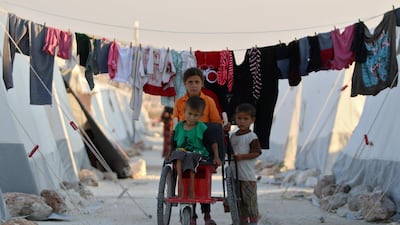Russia is to hold major naval exercises in the Mediterranean Sea over the next week, ahead of an anticipated offensive against the last remaining rebel-held Syrian province of Idlib.
Some 25 vessels and 30 planes will take part in the exercises, which will include anti-aircraft and anti-submarine drills, Russia’s Ministry of Defence said on Thursday.
The announcement came amid rising tensions between the US and Russia over the planned Idlib operation, which Moscow and its Syrian government ally hope will finish off military opposition to the rule of President Bashar Al Assad.
Damascus has promised to recapture the territory, with government forces all but surrounding the northern province over the last few weeks. Russia has also bolstered its naval forces off the coast of Syria in recent days.
An initial assault is expected to target the southern and western parts of the province, while negotiations between Turkey and Russia continue over the fate of Idlib city.
_______________
Read more:
As regime plans Idlib offensive, US warns Assad and Russia against chemical attack
Yemen peace talks in Geneva will be start of a long process
US warns Russia and Syrian regime against chemical weapons use
_______________
The planned operation has prompted a public war of words between the US and Russia, which has intensified in recent days as the operation seemed to move closer.
Russia’s Ambassador to the United States Anatoly Antonov warned the US against "groundless and illegal aggression against Syria" on Thursday, and repeated claims from Russian officials that Syrian rebels were planning to stage a chemical attack.
“This provocation being prepared with the active participation of the British intelligence forces can serve as a pretext for the Western ‘troika’ (Washington-London-Paris) to launch another airstrike against Syrian military and civil infrastructure,” said a statement attributed to Mr Antonov on the Facebook page of the Russian embassy in the US.
In turn, the US has accused Russia of fabricating intelligence of a staged chemical attack by rebels as a way of covering for Damascus, which has used chemical weapons multiple times throughout the conflict.
Washington has promised a tough response to any verified chemical weapons attacks in Idlib, and US Defence Secretary James Mattis said this week that he had been in "active communication" with Moscow to deter the use of such weapons by Mr Assad's forces.
In an effort to find an alternative to a full-scale assault, talks between Russia, Iran and Turkey have taken place over the past week. Turkish officials have declared Idlib a “red line”, and President Recep Tayyip Erdogan has lobbied Russia to prevent an attack. But so far no agreement has been reached.
A major justification for the impending offensive is the presence of Hayat Tahrir Al Sham (HTS), a coalition led by Al Qaeda's former Syria affiliate, which controls around 60 per cent of the province. The UN estimates that the group has around 10,000 fighters active in Idlib.
The rest of the province is controlled by Turkish-backed rebels, and Turkey has 12 observation posts set up around the borders of the territory. Ankara has tried to use its influence to rein in HTS and urged it to dissolve. But the group’s leader, Abu Mohamed Al Jolani, previously described any talk of surrender as “treasonous”.
In the meantime, a build-up of Russian and Syrian forces around Idlib has raised fears that an attack is imminent, and prompted dire warnings for the safety of the more than 2.5 million civilians in the province.
The UN's Syria peace envoy, Staffan de Mistura, called for a humanitarian corridor to be established to allow civilians in Idlib to flee the fighting, and offered to travel there to ensure it is implemented.
"I am once again prepared… personally and physically to get involved myself, with the government cooperation this time… to ensure such a temporary corridor would be feasible and guaranteed for the people so that they can then return to their own places once this is over," he told reporters in Geneva on Thursday.
The UN has estimated that some 800,000 people could be displaced in the early stages of an attack, which would stretch already struggling humanitarian services beyond breaking point.
Idlib has become a safe haven for displaced people from across Syria — more than a million have escaped from other parts of the country. Tens of thousands are living in overcrowded camps, and the World Health Organisation has warned of rising rates of acute malnutrition in the province.

